How to Get Your Horse Enough Fiber
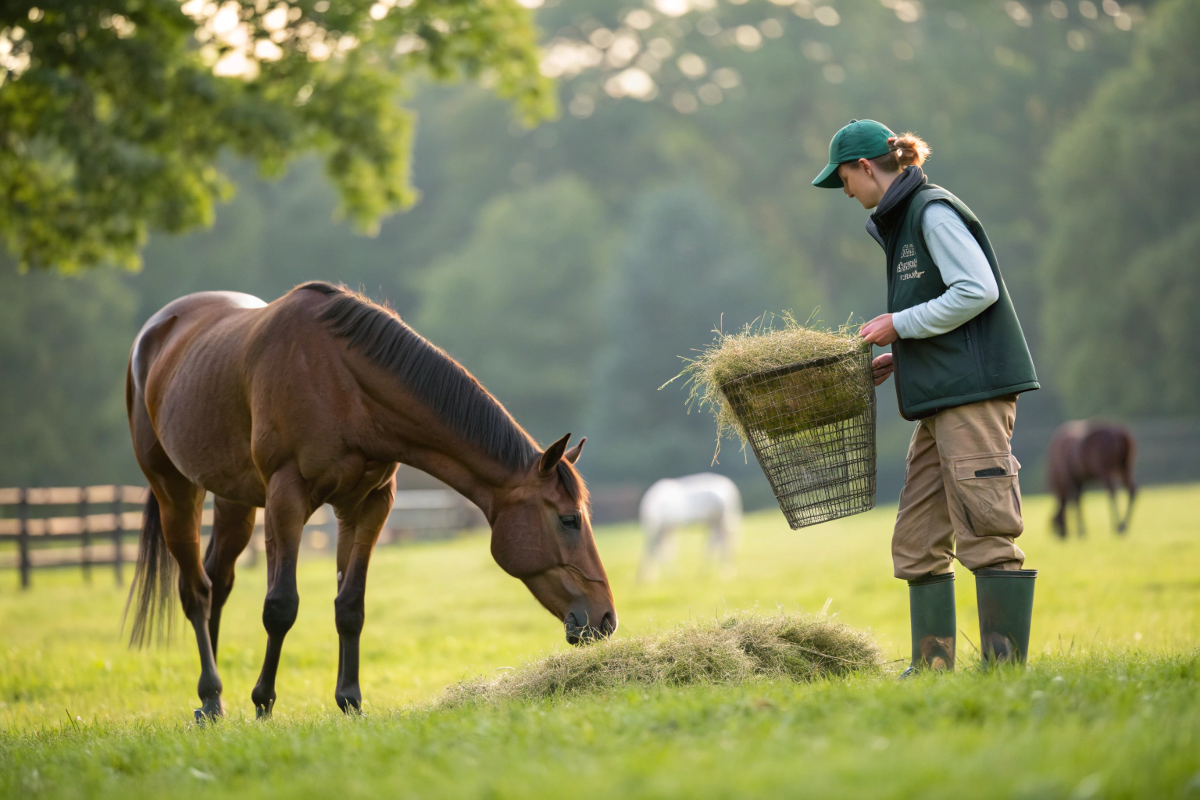
A balanced equine diet starts with one core nutrient: fiber. From digestion to sustained energy, fiber plays a crucial role in your horse’s health, performance, and happiness. But getting that fiber right means knowing what forms are ideal, and how your horse’s specific needs determine what works best.
If you’re looking for a horse fiber supplement that supports peak performance and works with your animal’s natural digestion, you’re in the right place.
Why Fiber Is Essential for Every Horse
Horses are grazing animals by nature. Their digestive systems are designed to consume forage throughout the day. Fiber provides the roughage required for healthy gastrointestinal (GI) function, aids in hydration retention, and plays a key role in nutrient absorption.
When a horse’s fiber intake is too low, the consequences can be severe:
- Colic: A lack of bulk in the GI tract can contribute to impaction colic.
- Ulcers: Limited chewing time and stomach acid buildup can cause gastric ulcers.
- Behavioral issues: Horses not getting enough fiber may develop anxiety or chewing habits.
By contrast, a diet rich in appropriate fiber sources leads to:
- Steady energy levels
- Healthy digestion
- Smoother metabolic function
- Better body condition
- Fewer behavioral problems
Fiber isn’t optional — it’s foundational.
Forage vs. Feed: What’s the Difference?
A common mistake is confusing forage with feed. Here’s a simple distinction:
- Forage includes high-fiber materials like cubes, pellets, or chopped hay, which make up the bulk of a horse’s diet.
- Feed refers to concentrated nutrients, usually grain-based, designed to supplement forage.
Forage is your horse’s primary source of fiber. It’s not just filler — it’s fuel.
Unlike animal feed in general, forage for horses must prioritize fiber content, digestibility, and natural chewing behavior. That’s why Greenway Animal Nutrition focuses on forage pellets and cubes, not meal or mash-style feeds. These formats support fiber needs while respecting the equine digestive system.
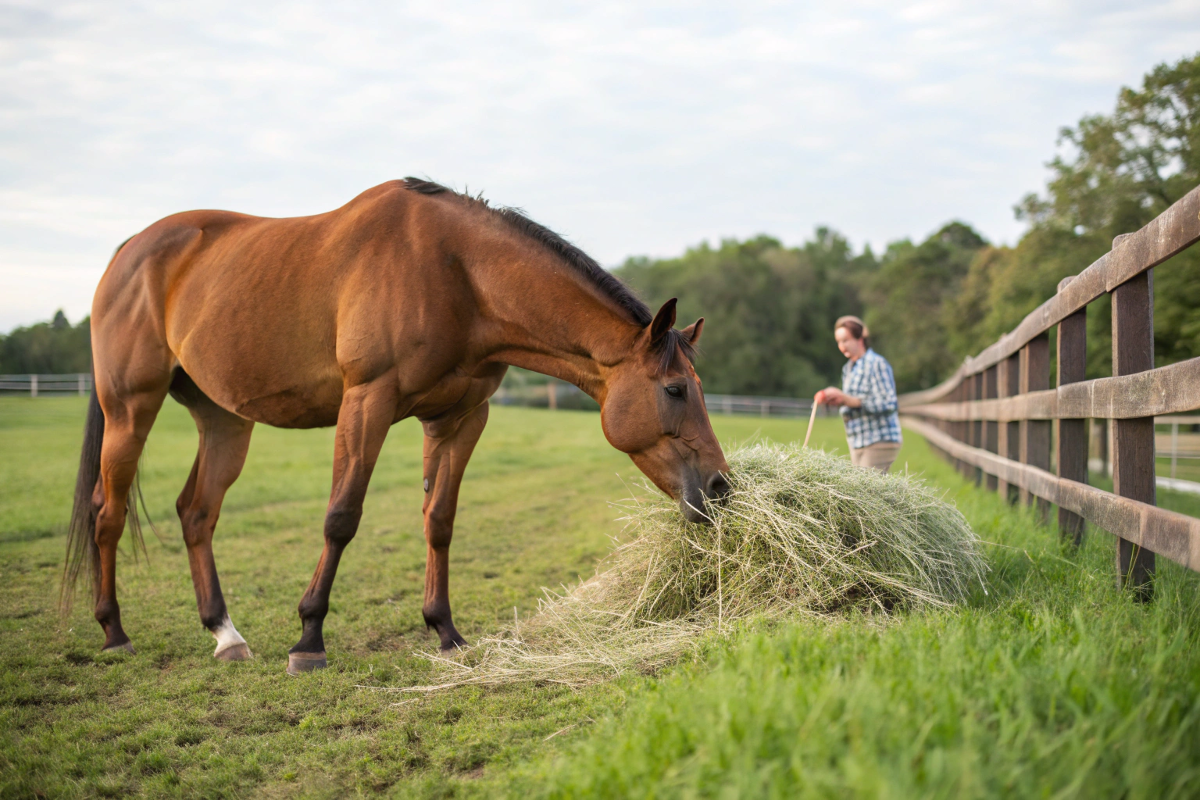
What Type of Forage Is Best?
At Greenway Animal Nutrition, we recommend two specific forms of forage:
-
Forage Cubes
Cubed forage is made from chopped, high-quality fiber sources compressed into dense blocks. It is especially beneficial for:
- Performance horses needing energy-dense, top-quality forage
- Older horses with dental issues
- Horses with respiratory conditions, as cubes reduce airborne dust
Cubed forage is often made from alfalfa or timothy. At Greenway, we emphasize excellent quality cubes, sourced and processed with care to maintain nutritional value.
For high-performance horses, cubed forage is not optional — it’s essential. These athletes require higher caloric density, digestibility, and consistency than average horses.
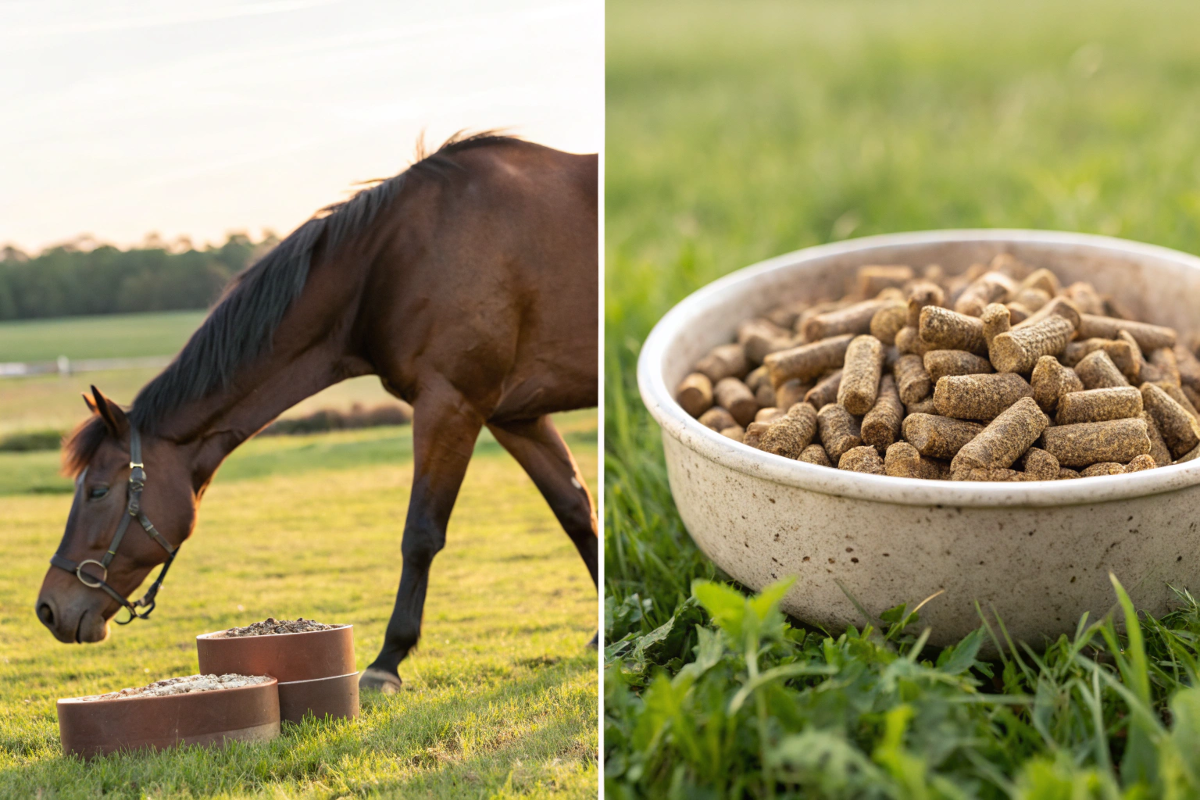
-
Forage Pellets
Pellets are smaller than cubes and made from ground forage compressed into uniform shapes. They do not replace full daily forage needs, but serve as an excellent supplement.
Pellets are ideal when:
- You need to increase fiber without changing the main forage source
- Your horse is a picky eater or requires an easier-to-chew supplement
- You’re balancing out a less-than-perfect pasture diet
Pellets also offer convenience — they’re easy to measure, store, and mix into existing feeding routines.
Important: Pellets should never be the sole forage source. They lack the long-stem fiber that supports normal chewing behavior and GI motility.
Soaking Forage Pellets and Cubes: When and Why
While soaking isn’t mandatory, it is recommended. Soaking helps:
- Prevent choke, especially in older horses or fast eaters
- Improve water intake, aiding digestion and hydration
- Enhance palatability for picky eaters
Soaking Guidelines:
- Minimum: 30 minutes
- Until: Cubes or pellets are fully softened
Always use clean, fresh water, and discard any uneaten soaked forage after a few hours to prevent spoilage.
Note: In colder months, use warm (not hot) water to encourage soaking and reduce feeding delays.
Bedding Considerations: Only Bagged Straw
While forage is for feeding, we can’t forget about the environment your horse lives in. Bedding is important in health, especially for respiratory comfort and hoof hygiene.
Greenway Animal Nutrition recommends using:
- Bagged chopped straw – clean, natural, and biodegradable
- Pelleted straw bedding – dust-free, absorbent, and low-maintenance
Avoid feeding any form of bedding straw, regardless of appearance or aroma. Straw does not provide digestible fiber for horses and could increase colic risk if ingested.
By separating bedding from forage, you’re promoting both safety and optimal nutrition.
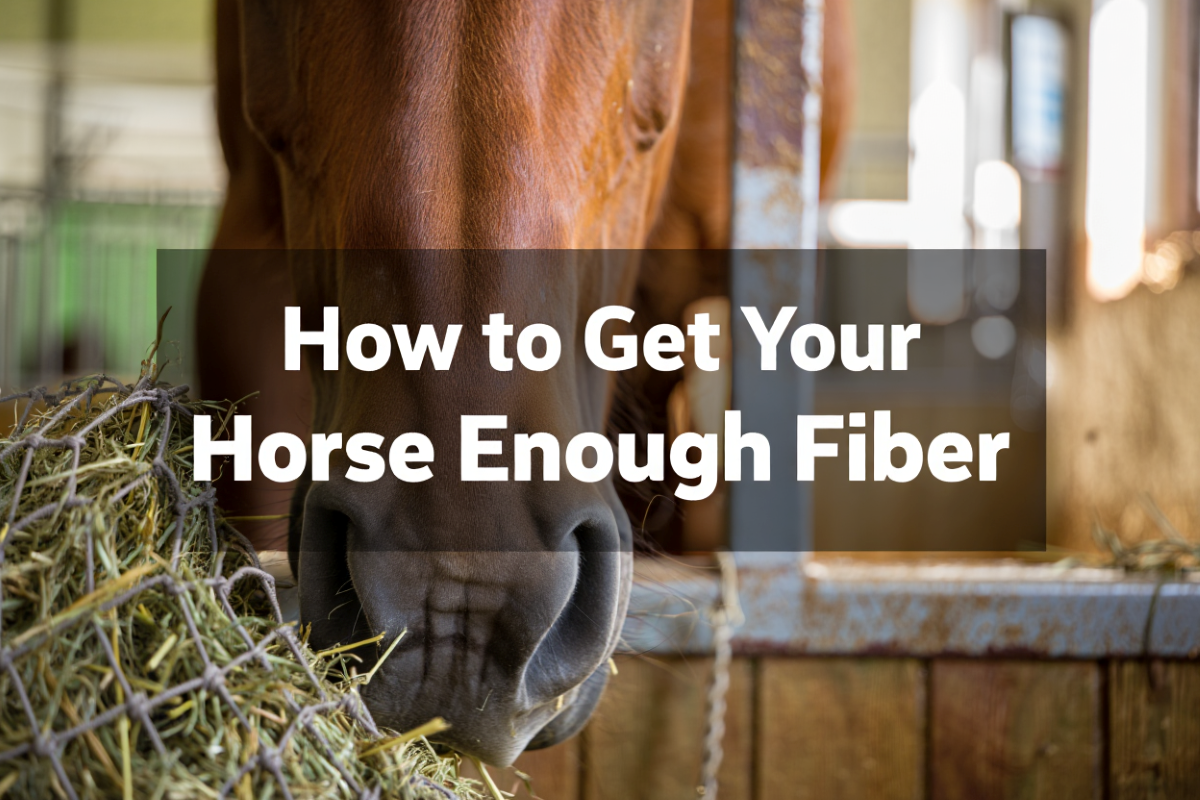
How Much Fiber Does Your Horse Need?
While exact requirements depend on breed, age, workload, and health status, the general guideline is:
Horses should consume 1.5–2.5% of their body weight in forage daily.
For a 1,000 lb horse, that’s 15–25 lbs of forage, with performance horses needing even more.
But weight isn’t everything. Quality matters just as much. Poor-quality forage might technically meet weight needs but lack digestibility, protein, or nutrient content.
That’s why Greenway focuses on premium-quality cubes and supplement pellets — to ensure every bite counts.
Performance Horses: Why Fiber Quality Is Non-Negotiable
Your horse needs more than average forage if you’re training, racing, or competing. Performance horses face elevated metabolic demands, and their diets must reflect this.
Key considerations for these animals include:
- Higher calorie density: Cubed forage packs more nutrition into each bite.
- Reliable nutrient profile: Avoiding hay variability supports training consistency.
- Reduced dust and mold: Essential for maintaining respiratory health under stress.
Cubed forage from Greenway Animal Nutrition is meticulously sourced and processed to meet these high standards. Whether your horse is on the track, in the arena, or on the trail, they deserve exceptional fiber.
When to Add Pellets
Think of forage pellets as your dietary tuning tool. They’re perfect when:
- Your horse needs extra fiber without a full diet overhaul
- The available forage isn’t quite enough in quality or volume
- You’re managing a horse with special dental or metabolic needs
Our pellets are made only from clean, digestible forage sources, free from fillers or additives.
Always introduce any fiber supplement gradually and monitor for changes in behavior, body condition, and manure quality.
Common Mistakes to Avoid
Getting your horse enough fiber isn’t complicated, but small missteps can lead to nutritional imbalances or health problems. Avoid the following:
Using feed instead of forage
Grains, sweet feed, and complete rations are not high enough in fiber to replace true forage. They’re supplements, not a substitute.
Ignoring forage quality
Visually clean forage doesn’t guarantee digestibility. Mold spores, nutrient leaching, and improper curing can all affect quality.
Relying on pellets as the sole forage
While they’re convenient, pellets lack the “scratch factor” of long-stem fiber that horses need for gut motility and dental wear.
Feeding bedding straw
Straw — even soft and golden—is not acceptable forage. Its high lignin content makes it hard to digest and nutritionally void.
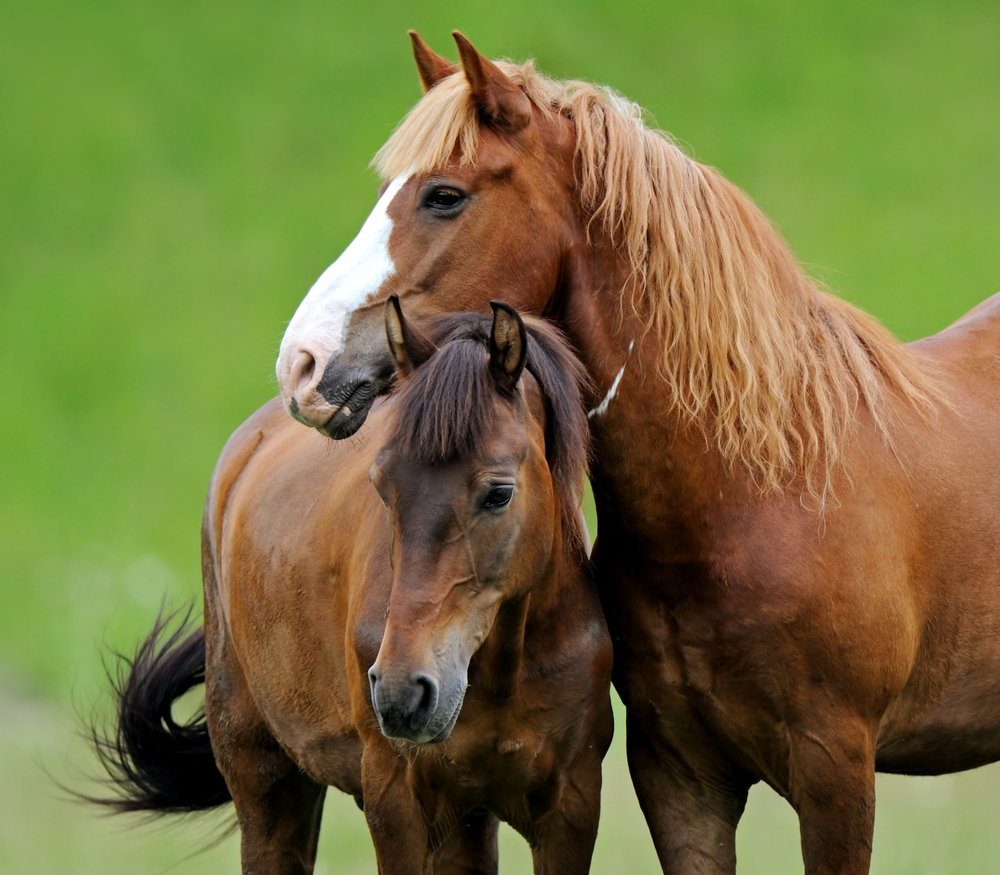
Choosing the Right Forage Partner
With so many forage options on the market, it can be overwhelming to know what’s best for your horse. At Greenway Animal Nutrition, we simplify the process by focusing on what matters most:
High-Quality Sourcing
Only the best forages — clean, dense, and free from harmful contaminants.
Pelleted and Cubed Options
Easy-to-handle, naturally structured forage.
Animal-First Philosophy
We believe in giving back — not just to animals, but to their caretakers. Whether you’re a trainer, breeder, or weekend rider, your horse’s health is our mission.
Tailored Products
Our product lines adapt to your needs, whether you’re feeding a single retired companion or managing a stable of performance horses.
Fiber Is Fuel, and Your Horse Deserves the Best
Whether your horse is an elite athlete or a beloved pet, fiber is the foundation of their diet. Choosing the right type and amount of forage is one of the most impactful decisions you can make for their health, comfort, and longevity.
You don’t have to compromise on quality. With Greenway Animal Nutrition, you get forage that’s not only nutritious and clean but also thoughtfully formulated for the unique needs of horses.
![]()
Partner With Greenway Animal Nutrition Today
At Greenway Animal Nutrition, we recognize that high-quality feed is essential for maintaining healthy, well-nourished horses. That’s why we offer premium forage products designed to meet the needs of horse owners, breeders, and trainers.
Whether you’re caring for a high-performance racehorse, a trusted riding companion, or a herd on your farm, our diverse selection of forage pellets and cubes provides a reliable feeding solution.
Contact us today to learn how our fiber-rich, high-performance forage products can elevate your feeding program. Explore our offerings and discover the difference quality makes.